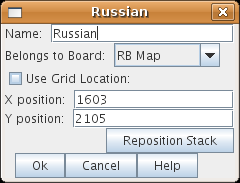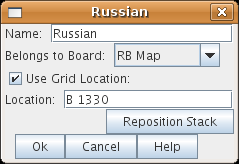VASSAL Reference Manual
Home > Module > Map > At-Start StackAt-Start Stack

An At-Start Stack is an ordinary stack of
playing pieces that is initialized at the beginning of every
game. It is appropriate for any fixed pool of counters.
Once the game begins, the pieces are in place just as if they had been
dragged from the Game Piece Palette, except that no more can be created
during the course of the game.
Name: The name is not used during game play. It is just used for identification in the module editor.
Belongs to board: If a name is selected, the stack will appear on that particular Board. If a game does not use that Board, then the stack will not appear. If "<any>" is selected, then the stack will always appear at the given position, regardless of the boards in use.
Use Grid Location: If selected, you can enter the position of the stack using a descriptive location name. Otherwise, you must specify X and Y coordinates.
X,Y position: The position in the Map Window of the center of the deck. If this stack belongs to a Board, the position is relative to the Board's position in the Map Window.

Location: The location of the stack as a descriptive location label as returned by Grid Numbering or the name of a Region. The grid numbering system must provide enough information to define a specific location on the map (for example, $gridLocation$). However, if a zone in a Multi-zone Grid does not specify a grid, the center of the zone will be selected.
EXAMPLE: A strategic game in which a nationality has a fixed force pool of Infantry, Armor, etc. counters can be modeled by making a Map Window representing the force pool, with an At-Start Stack of Infantry counters, an At-Start Stack of Armor counters, etc. In order to guarantee that the number of each type of counter is fixed, the Clone and Delete functions of the Infantry and Armor counters should be disabled.
Name: The name is not used during game play. It is just used for identification in the module editor.
Belongs to board: If a name is selected, the stack will appear on that particular Board. If a game does not use that Board, then the stack will not appear. If "<any>" is selected, then the stack will always appear at the given position, regardless of the boards in use.
Use Grid Location: If selected, you can enter the position of the stack using a descriptive location name. Otherwise, you must specify X and Y coordinates.
X,Y position: The position in the Map Window of the center of the deck. If this stack belongs to a Board, the position is relative to the Board's position in the Map Window.

Location: The location of the stack as a descriptive location label as returned by Grid Numbering or the name of a Region. The grid numbering system must provide enough information to define a specific location on the map (for example, $gridLocation$). However, if a zone in a Multi-zone Grid does not specify a grid, the center of the zone will be selected.
EXAMPLE: A strategic game in which a nationality has a fixed force pool of Infantry, Armor, etc. counters can be modeled by making a Map Window representing the force pool, with an At-Start Stack of Infantry counters, an At-Start Stack of Armor counters, etc. In order to guarantee that the number of each type of counter is fixed, the Clone and Delete functions of the Infantry and Armor counters should be disabled.